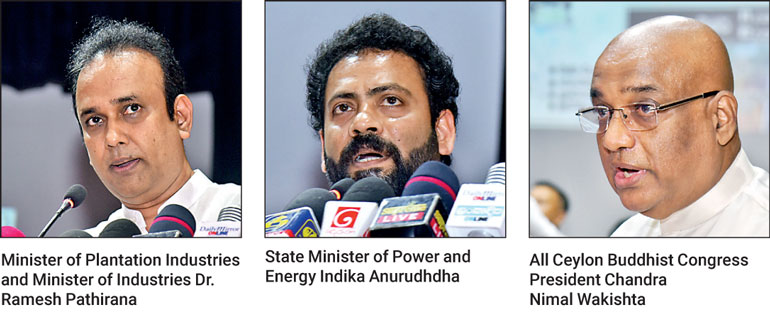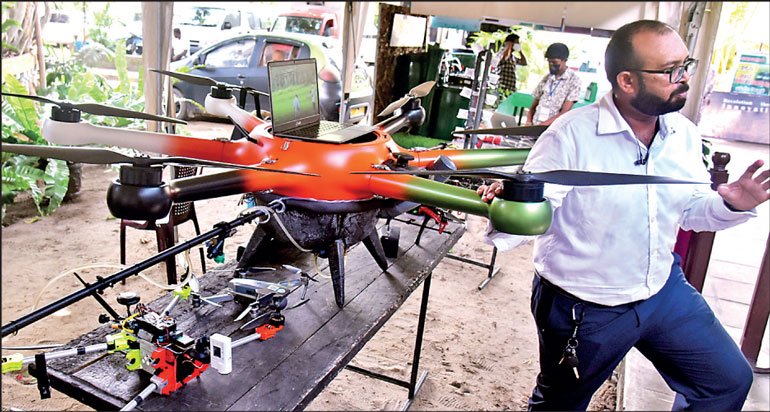Monday Feb 23, 2026
Monday Feb 23, 2026
Saturday, 17 September 2022 00:00 - - {{hitsCtrl.values.hits}}

By Surya Vishwa
The renewable energy promoting exhibition and forum held last Sunday and Monday (11-12 September) by the All Ceylon Buddhist Congress (ACBC) at the premises of the organisation in Bauddhaloka Mawatha, Colombo 7 showcasing around 80 inventions revolving primarily around renewable energy resources clearly proved Sri Lanka has enough talent to rescue itself from squandering its monies on fossil fuel resources of other nations.
The exhibition of invention and renewable energy entrepreneurship was organised in collaboration with the Inventors Commission and the Bank of Ceylon (BOC), with the support of the Sustainable Energy Authority (SEA), and diverse other institutions.
The overall objective of the event was to make renewable energy sufficiency of Sri Lanka a reality in the short and long term, assisting the country to have green energy goals systematically within five years and thereby help transform the nation’s economy positively.
Around 80 inventors working around the theme of renewable energy were provided free stalls to showcase their inventions.
Among these were a water sealed bio gas unit by inventor Harsha Kumara Gallage, a mountain rain harvesting and distributing technology system and charcoal making machine by W.S. Karunadasa (alongside around six more inventions related to alternate coal energy cooking solutions), an electric bicycle by S. Thesigan, R. Lekass and V. Shathurankan and a hydrodynamic sea water power plant by Madusha Perera, amongst others. The Harmony page of the Weekend FT will feature some of these inventions in the upcoming editions and carry the realities faced by the inventors in developing and marketing their creations.
Below is the brief narration from the inventor, Harsha Kumara Gallage who had made a new type of bio gas unit which is part of a series of inventions he is working on to make Sri Lanka into a zero plastic clutter zone.
“Compared to the bio gas technology this is an advanced version that has taken into considerations the issues faced by the other versions,” said Harsha Kumara Gallage speaking of his bio gas unit made out of barrels and pipes.
He had started his inventing journey from the age of seven and uses Buddhist meditation techniques for obtaining his inspiration.
“For me, personally, the primary need to create an invention arises out of clearing the unnecessary rubble from the mind. Often I am asked if I have a PhD and such qualifications and then I am asked by professors how I develop these inventions and I tell them about Buddhist meditation,” he smiles.
“Any form of knowledge should be superior so that it creates only good – for humans – animals – plants or soil. This is the rule I follow,” he states.
“This bio gas unit version I have made, retains the methane gas inside the frame by a water plate which has not been before in Sri Lanka. One advantage of the water sealing is that the emergence of the smell is prevented. I researched this unit for some time looking at the shortfalls of the existing models of the bio gas units and made many connected modifications,” he stated.
Hailing from Pugoda he has so far four international patents – with two pending and two completed and six local patents including for the water sealed bio gas unit.
“With the exposure received at the ACBC event, I have got several requests for mass scale manufacturing. My plan is now to also get an advanced patent for this particular invention to exhibit internationally,” said Gallage who had also been recognised by Sir Arthur C. Clarke 17 years ago for his invention of an ‘adjustable robotic arm for demining’, invented in 2005. He has by now developed an advanced version of his original invention to better target the speedier removal of mines from acutely affected war areas of the world. A detailed interview with inventor Harsha Gallage will be carried on this page in our next edition.
Below is the narration by Madusha Perera, a Colombo University 1st year student in Physics who has invented the idea for a zero carbon footprint Sea Water Power Plant hub. Hailing from Negombo Madusha Perera states that if a State based decision is taken to invest the needed amount – summed up to be $ 700 million that there could be uninterrupted power provided throughout the island, channelling the sea water resource based energy of the country. It is the opinion of this writer that although the amount may seem high given that Sri Lanka has drained away its money wasting it on fossil fuel of far flung countries, that this amount seems like a pittance to invest in a national sustainable energy venture.
In the upcoming editions of this page we will feature the full scale interview with this inventor and what is required nationally to ensure that we no longer ignore inventions such as these.
BOC officials stated that it has already commenced a renewable energy promoting loan scheme for households and industries, as part of their 83rd anniversary celebrations which commenced on 1 August. Hence the bank will be supporting the renewable energy entrepreneurs and inventors selected for the exhibition to follow up on financial assistance needed to improve their products. The business arm of the ACBC will provide the exhibitors with the technical knowhow needed to better support for the bank loan facilitation through the BOC.
The overall aim of the renewable energy invention exhibition was to motivate school children and youth to develop innovations linked to entrepreneurship with the goal of influencing the education system to make Sri Lanka produce job creators through innovation rather than job takers.
At the event schools were encouraged to apply for the innovations its students had carried out and all six schools who had applied received special certifications awarded by the All ACBC. These schools are Wariyapola Sumangala Vidyalaya, Colombo Devi Balika Vidyalaya, Kandy Girls High School, Kankasanthurei Hindu Vidyalaya, Gampaha Rathnavalee Vidyalaya and C.W.W. Kannangara Vidyalaya.



The point made collectively at the event was that fossil fuel dependency could be reversed with a national awareness on renewable energy provided progressive schemes were set in place to safeguard and encourage the potential of inventors to especially prevent them from leaving the country to get support for their work.
“This is what the All Ceylon Buddhist Congress as one of Sri Lanka’s apex national institutions is attempting to do; to retain Sri Lanka’s talent within its country while encouraging them to rise to the current challenges,” ACBC President Chandra Nimal Wakishta said.
He emphasised that the event was not just a one-off event but the beginning of a national mission and that the institution will commit to maintain its consistency. Wakishta reiterated that the ACBC upholds Buddhist values of non prejudice and thereby functions with a national consciousness for the wellbeing and unity of the entire nation and all its people.
“Our vision is to have a country known for its human resources connected to innovation especially linked to renewable energy and to raise the percentage of inventors and entrepreneurs in the country. We are a country of unlimited natural resources and this knowledge should transfer to the education sector and thereafter should inspire the younger generation towards creativity and innovation,” he said.
The renewable energy invention based event and forum was described as the first seed of this objective.
The stalls set up at the ACBC premises were made available free for inventors and entrepreneurs who showcased their work connected to sustainable energy.
The selection of the inventions showcased was carried out by the Inventors Commission which has worked previously as well with the ACBC to promote entrepreneurship and innovation.
Nalin Dolawatte, director at the Inventors Commission stated that follow up activities are being planned with school inventors clubs to create renewable energy awareness in all parts of the country and to identify inventions carried out so far in this regard.
“We will be evaluating and following up on the event held to fulfill the goal of renewable energy national self-sufficiency,” Dolawatte said.
ACBC Vice President and former Inventors’ Commissioner Dr. L.M. Keerthi Tillekeratne said that the ACBC hopes to work with a long-term objective with the education sector of the country and diverse other stakeholders to make invention part of the school curricula where children learn to understand what the natural resources and issues of the country are and learn to find ways to maximise its potential.
“We showcased at this event some remarkable innovations from Sri Lanka, most of which are directly linked to diverse solutions to the challenges we are facing currently. One or two of the innovative findings may appear simple but it is extremely profoundly useful at a practical level. An invention is something that is linked to a particular knowledge that we do not commonly possess and is innovated upon,” Dr. Tillekeratne said, using as example a finding by an innovator who had revealed at the ACBC event on how to save 60% of electricity of the rice cooker by placing the raw rice with the minimum amount of water as used traditionally and draining off half of that quantity after soaking precisely for half an hour and then boiling the rice.
“I tried this after this inventor informed me of this and found that it works. This is the kind of information that goes to create inventions. Sometimes we think that innovative findings should be very complex but most of the time it is not,” he added.
Another cooking related innovation developed by an inventor exhibiting at the event was a segmented rice cooker which could cook rice and curries or different types of rice in the same unit, saving electricity in large quantities.
Pix by Ruwan Walpola